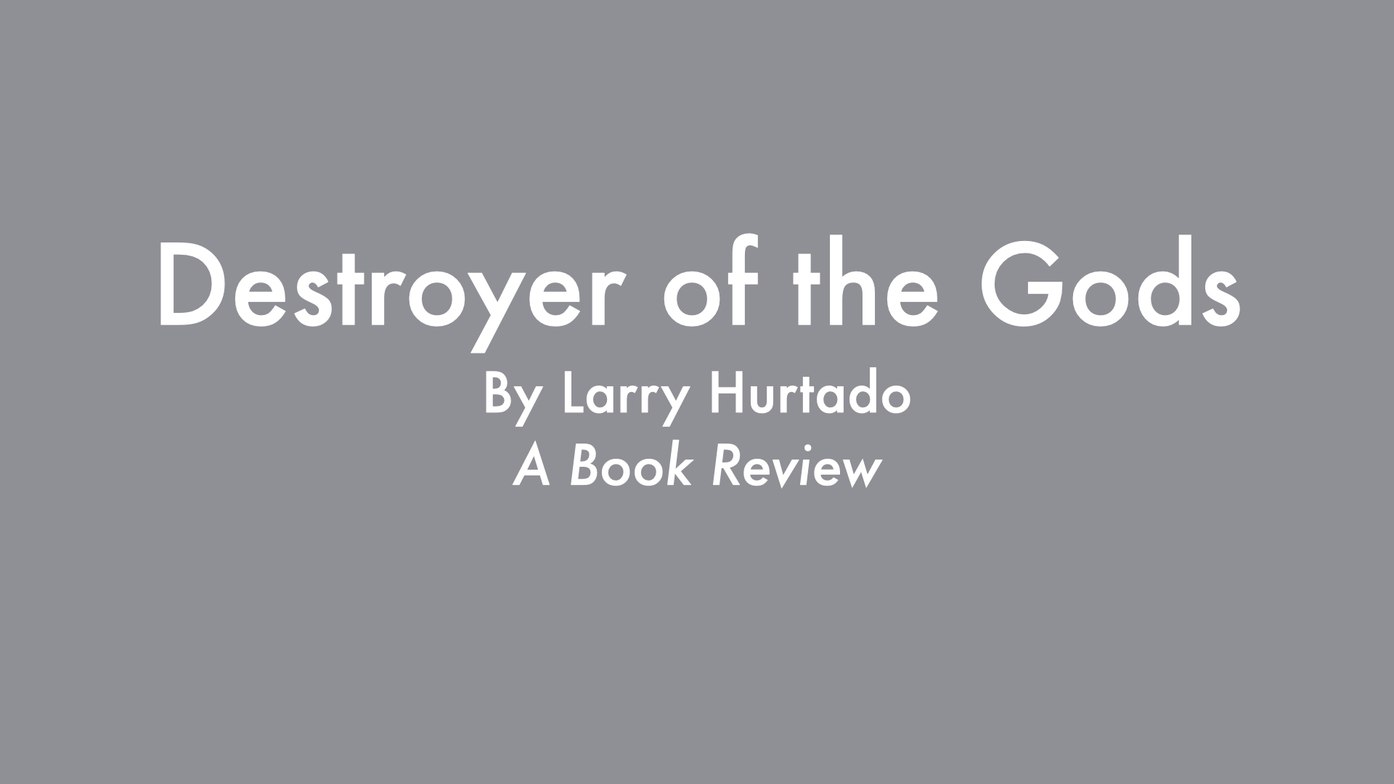
The following article is a snippet from a submitted assignment for my Doctor of Ministry (Engaging Mind and Culture) at Talbot School of Theology.
Hurtado, Larry. Destroyer of the Gods: Christian Distinctiveness in the Roman World. Waco TX: Baylor University Press, 2016.
Larry Hurtado’s Destroyer of the Gods is a look at how Christianity set itself apart from the wider accepted “religion, piety, identity, and behaviour” of the Greco-Roman world in its first three hundred years (Preface, xii). This analysis will accomplish three tasks. First, it will summarize the main arguments and points of the work. Second, it will critique the book, showing two strengths and one weakness. Finally, I will relate the book to my ministry.
Destroyer of the Gods is an examination of the first three centuries of church history. The thesis of the book is twofold.
- First the author addresses current cultural amnesia. It is easy for people in the West to overlook the contributions of early Christianity. We cite them as normal and accepted, while in the earliest form, they were considered odd and even remarkable (13). Modern people fail to understand how the Christian movement was distinct from the mores, norms, and culture of the time. Although Christianity was heavily persecuted and carried enormous social costs, Hurtado notes how it remarkably increased in numbers.
- Secondly, Hurtado “focuses on several features of early Christianity that made it unusual in the Roman period” (1). These “features” are developed through the book. One of these features, was how the early Roman thinkers and writers viewed Christianity (15). The responses from these people ranged from disdain and hatred to even a quiet admiration (27). It was because Christians offered a distinct way of life in a world saturated with pagan religions and idols that Christians were regarded as different. Instead of following the pantheon of gods and rituals, “Christians were to treat the many other deities of the time as unworthy beings, and the worship of them as idolatry” (63).
Another feature of early Christianity was that it bestowed a “new identity” to its followers.
Instead of an identity that one would inherit through birth or ethnicity, Christianity offered a “corporate religious identity” that was “distinguishable from, and not a corollary of, one’s family, civic, or ethnic connection” (104). Additionally, the author emphasized the importance of literature in Christianity. Hurtado defined this as the “bookish” nature of early Christianity. To transmit its beliefs, Christianity relied on the proper copying and disseminating of scripture. The early Christians succeeded circulating the scriptures translocally. This brought cohesion and growth to the movement and was also a distinctive in the Roman world.
Finally, Early Christians were known for their ethical behavior (in areas like marriage, sexuality, and social activism). As Christians followed Jesus in these areas, they departed “from what was tolerated and even approved in the larger Roman culture” (181).
As the early world viewed Christians, they did not just notice a different set of ideas, but also a different way of life.
It is because of these features that Hurtado hopes to correct our current amnesia and to recognize and appreciate the “importance and influence” of early Christianity (189). The early Christian community was both offensive to the wider culture, but also attractive as they lived out their faith. They sought to be grounded in the Scriptures, which naturally set them apart from the expectations, norms, and expectations of the wider culture.
A strength of this book was its historical examination. Hurtado makes it clear that his goal is not a defense of Christianity but historical investigation (7). To do this he presents the viewpoints of early opposers to Christianity like Celsus; he traces the amount of deliberate work to propagate scripture and spread Christian thought; he emphasizes Christian ethics concerning suffering and sexuality as acts of worship. Ironically, as these arguments build upon each other, the book does form a strong apologetic and a compelling case for Christianity. It turns out that an analysis of history does indeed provide a compelling defense for the veracity of Christianity. Another strength of the book was Hurtado’s investigation of the term “religion” in chapter two.
As a key theme in the book, Hurtado stresses the cost and obedience of early Jesus followers. Informed by European imperialism and colonialism, we think of religion as a “distinguishable area of life” like warfare or music (41). Instead, the Roman world was one full of gods – connected to every sphere of life and every stratum of society. In contrast, Christians refused to bow to these gods and rituals and thus were distinct. With this distinction, Hurtado shows the early cost of following Jesus.
A weakness of the book was the author’s failure to connect how “Christianity introduced a new kind of relationship with truth and with God.”[1] It wasn’t just the intellectual and cultural backgrounds to Christianity that made it distinct, but it was real people’s experiences with God through Jesus Christ. Unlike Roman paganism, Christianity offered a personal relationship with God, based on forgiveness. Instead of being afraid of the gods for not honouring them, Christianity offered a God who “cares” and “in whom you can trust.”[2] This, according to John Frame, “was a new way of thinking.”[3] Hurtado failed to provide theological reasons for its distinctiveness. It was not just that they behaved differently, it is that their beliefs offered a life-transforming experience of God.
Keep Christianity Weird is the title of Joshua Kinlaw’s review of Destroyer of the Gods on the Catholic online publication First Things.[4]
Not just a memorable title, this also summarizes the practical application of this book to my ministry. Hurtado offers a look at how Christians stood out in their culture. As we try to integrate our faith in our current moment, I believe the call of Jesus to the church then, is the call of Jesus to us now: we need to keep Christianity (beautifully) weird. We are being called by Jesus to follow the convictions and ethics of our spiritual ancestors. Increasingly, the church must reach out to those on the margins who have the greatest needs. Regarding child exposure, Hurtado notes, “the only wide-scale criticism of the practice, and the only collective refusal to engage in infant exposure in the first three centuries AD, was among Jews and then also early Christians” (148). It was the people who didn’t have worth or a voice, that Christians dignified and loved. Recently our church opened, in partnership with another local Christian agency, an emergency weather shelter in our church gym, to bring safety and warmth to the homeless population of our city on the coldest nights of the year. Our leadership team felt that this was our unique contribution to our city and this community, to bring dignity and safety to the people of our city who sleep on the streets. Destroyer of the Gods offered encouragement to me, to continue to love Jesus, and to love those who are most often disregarded or forgotten in our community.
This summary set out to do three things.
- The first was to summarize the book Destroyer of the Gods by Larry Hurtado. Early Christians set themselves apart from the Roman world due to their allegiance to Jesus and the Scriptures. This made them both attractive and offensive to the wider culture.
- Second, I noted two strengths and a weakness of the book. An examination of the history of Christianity provides a compelling argument for its relevance and truthfulness. Another strength was Hurtado’s emphasis on how Christians both saw and lived out their “religion” differently than others. However, the author failed to bring theological reasons for Christianity’s distinctiveness. He did not show how the early Christians experience of God offered them something that no other pagan worldview or religion could. This was a weakness.
- Finally, I connected this book to my ministry. In the same way as Christians went to the people on the edges of society, so should the church today. It was this belief that led our church to invite those experiencing homeless to sleep in our gym during the coldest nights of the winter
As the Western Church faces more marginalization, the way forward is to learn from those who have gone before us, demonstrating radical and sacrificial love to those who need it the most.
Works Cited
Frame, John. Church History 1, Module 2.2. Online lecture. Knox Theological Seminary, January 23, 2015.
Kinlaw, Joshua. Keep Christianity Weird (blog). First Things. May 5, 2017, https://www.firstthings.com/web-exclusives/2017/05/keep-christianity-weird.
[1] John Frame, Church History 1, Module 2.2 (lecture, Knox Theological Seminary, Online, January 23, 2015).
[2] Ibid.
[3] Ibid.
[4] Joshua Kinlaw, Keep Christianity Weird (blog), First Things, May 5, 2017, https://www.firstthings.com/web-exclusives/2017/05/keep-christianity-weird.





